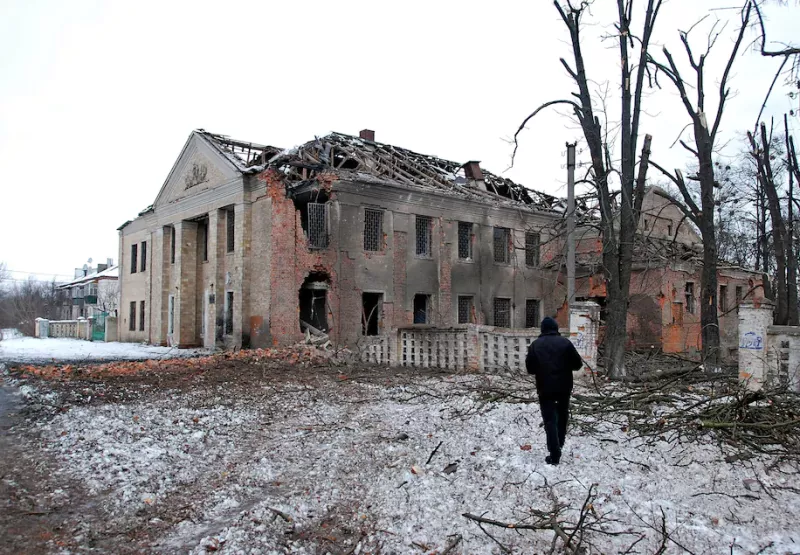
Ukrainians are enduring savagery. A friend from Kharkiv has left me a voice-mail message, describing how the Russian invaders are reducing the city to rubble: A shell killed dozens of people waiting in line for food. Bombs have been hitting nonmilitary buildings, even the zoo. The sorrow in his voice makes me tremble.
Russian President Vladimir Putin wanted to invade Ukraine to topple the government, but now he’s trying to punish Ukrainian citizens with airstrikes and artillery barrages. That in itself is a reason to fight back. But the way we’re doing it gives me a measure of hope amid the bloodshed. Right now, here in Ukraine, we’re seeing democracy in action — in the streets and on the battlefields. Until recently, defending democracy meant voting, organizing, fighting corruption, building up civic institutions. Now it means something else. Ukrainians are fighting to save the people — in the most literal sense. And everyone is involved, from top to bottom.
As I drive down the highways, I see ordinary men in their 50s and 60s manning checkpoints, defending their villages and towns. Elsewhere, we see footage of citizens — often including foul-mouthed middle-aged women — bravely trying to stop Russian tanks with their bare hands or protesting in front of Russian troops (as they’ve done in Kherson). Farmers use their tractors to drag away disabled Russian tanks.
People of all classes are supporting one another. A 82-year-old pensioner donated his savings to the army — and the owner of a Kyiv luxury restaurant uses his Porsche to deliver medicine. Ukrainian pop artists are recording videos on Instagram and Tik Tok, appealing to their fans in Belarus and Russia to stop the war. Billboards around the country are calling on Russian soldiers to leave or lay down their arms. IT specialists have developed applications that issue air-raid alerts for each region — responding to a call by the Ministry for Digital Transformation, run by a guy who was born in 1991, the year the U.S.S.R. collapsed. A hipsterish shoe company has switched to making combat boots, and mobile phone companies are sending out public service messages on “what to do if your phone is captured by the occupiers”.
We know that pluralism is our strength. World champion boxer Oleksandr Usyk, who is now fighting with the Territorial Defense Forces, has used social media to call on Russian soldiers to stop fighting. Usyk happens to be a devoted member of the Russian Orthodox Church in Ukraine, an institution that has been known to promote Putin’s nationalist ideology. He’s showing that being loyal to your faith doesn’t mean you can’t fight for Ukraine. (A Russian colonel taken prisoner by Ukrainian forces admits that listening to messages from Ukrainian sportsmen such as Usyk, whom he has always respected, made him “feel ashamed”.)
Today, democracy is about public service. Local mayors and governors in places such as Mariupol, Sumy or Mykolaiv have insisted on staying put despite the invaders’ relentless shelling and bombing. Two hundred and ninety members of parliament have refused to flee the capital even as it comes under intensifying attack: Their votes might be needed. The ex-prime minister has issued a master-class video on making molotov cocktails.
And then there’s Ukrainian President Volodymyr Zelensky. Investigative journalists were fiercely attacking him three months ago. Now they are standing with the government. The same goes for ex-president Petro Poroshenko — one of Zelensky’s bitterest enemies. Even formerly pro-Russian politicians have rallied around the current president.
Today Zelensky’s approval rating is 93 percent — unthinkable for any democratic leader under normal conditions.
Whenever Zelensky addresses the people of Russia or Belarus, he tries to appeal to their best instincts, explaining what it means to fight for one’s freedom. It might sound naive, but it’s what we believe. Meanwhile, Russia has criminalized any form of dissent. Anyone accused of spreading “fake news” can be sent to prison for 15 years.
That’s the nub of the matter. Dictators want reality to fit their imaginations, and when it doesn’t cooperate, their first instinct is to resort to coercion. Putin hasn’t experienced many challenges during his 20-plus years in power, but he can blame Ukraine for two of them. In 2004, he personally backed Ukraine’s presidential candidate, who tried to stay in power by claiming the elections were rigged. In 2014, when a kleptocratic president ordered the shooting of peaceful demonstrators, the Kremlin pushed hard to keep him in office. The regime collapsed, and Putin’s marionette escaped to Russia. That humiliated the Kremlin, but it inspired democrats around the former Soviet space, who saw that people’s power mattered. That’s something that Putin does not understand. But he is deeply afraid of it.
Over the past few years, the Kremlin has tried to corrupt the politicians in neighboring states with money, power and blackmail. But Putin’s entourage has never quite figured out how to assert their will over the entire society of Ukraine, with its democratically elected leaders. Now Russia is using brutal military force. For Ukrainians, Putin’s threats to kill Zelensky reveal a medieval mind-set: The other 44 million of us will go right on resisting.
If Ukraine’s democracy survives, it will crush the arguments of the tyrants who depict democracies as weak, incapable, chaotic. The question we’re all asking is: How many Ukrainians will have to die in the process?
Nataliya Gumenyuk, founder of the Public Interest Journalism Lab, is a Ukrainian author and journalist specializing in foreign affairs and conflict reporting.
